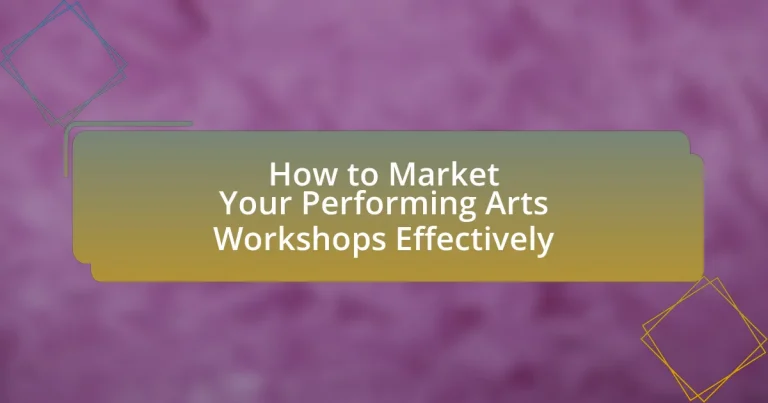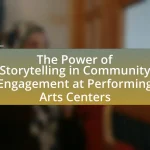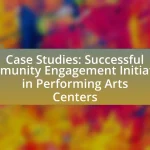The article focuses on effective marketing strategies for performing arts workshops, emphasizing the importance of leveraging social media, building partnerships with local organizations, and utilizing targeted advertising. It discusses how understanding the target audience can enhance marketing efforts, highlighting key demographics to consider and the influence of audience preferences on workshop content and marketing approaches. Additionally, the article outlines the role of branding, effective promotional tactics, and the benefits of email marketing, while addressing common challenges and budget constraints faced in marketing these workshops. It concludes with best practices for evaluating marketing success and measuring participant engagement.
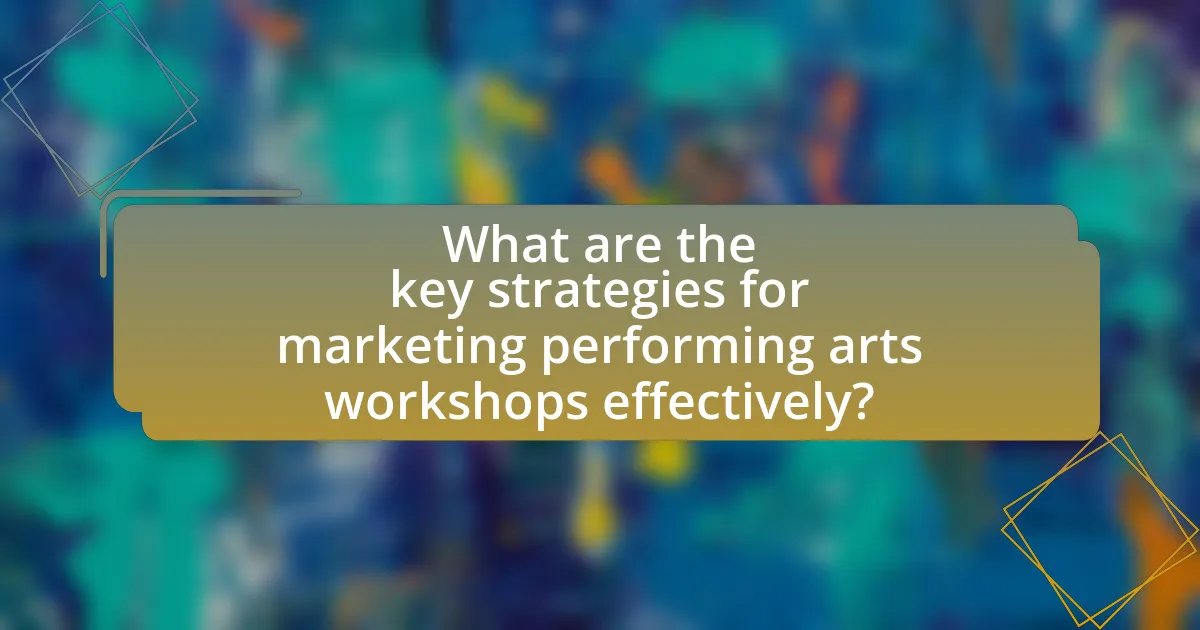
What are the key strategies for marketing performing arts workshops effectively?
The key strategies for marketing performing arts workshops effectively include leveraging social media, building partnerships with local organizations, and utilizing targeted advertising. Social media platforms like Facebook and Instagram allow for direct engagement with potential participants, showcasing workshop highlights and testimonials. Collaborating with local schools, theaters, and community centers can expand reach and credibility, as these organizations often have established audiences interested in the arts. Additionally, targeted advertising through platforms like Google Ads or Facebook Ads can help reach specific demographics, ensuring that marketing efforts are focused on individuals most likely to enroll. These strategies are supported by data indicating that social media marketing can increase engagement rates by up to 50%, and targeted ads can yield a higher return on investment compared to traditional marketing methods.
How can understanding your target audience enhance your marketing efforts?
Understanding your target audience enhances marketing efforts by allowing for tailored messaging and strategies that resonate with specific demographics. When marketers analyze audience preferences, behaviors, and needs, they can create content that speaks directly to those interests, increasing engagement and conversion rates. For instance, a study by HubSpot found that personalized marketing can lead to a 20% increase in sales. By focusing on the unique characteristics of the target audience, businesses can allocate resources more effectively, ensuring that marketing campaigns are not only relevant but also impactful.
What demographics should you consider when identifying your target audience?
When identifying your target audience for performing arts workshops, consider demographics such as age, gender, income level, education, and geographic location. Age influences the type of workshops that may appeal to different groups; for instance, children may be interested in introductory classes, while adults might seek advanced techniques. Gender can affect preferences in workshop themes or styles, as certain genres may resonate more with specific genders. Income level is crucial, as it determines the pricing strategy for workshops; higher-income individuals may afford premium offerings, while lower-income groups may require more accessible pricing. Education level can indicate the audience’s familiarity with performing arts, guiding the complexity of the content delivered. Geographic location is essential for understanding cultural influences and accessibility, as local interests may vary significantly. These demographic factors are supported by market research indicating that tailored marketing strategies based on demographics lead to higher engagement and participation rates in workshops.
How can audience preferences influence your workshop content and marketing approach?
Audience preferences significantly influence workshop content and marketing approaches by dictating the themes, formats, and promotional strategies that resonate with potential participants. Understanding the demographics, interests, and feedback from the target audience allows workshop organizers to tailor content that meets specific needs, such as incorporating popular performing arts styles or addressing common challenges faced by attendees. For instance, a survey conducted by Eventbrite in 2020 revealed that 70% of participants prefer workshops that offer hands-on experiences, indicating that interactive formats should be prioritized in content development. Additionally, marketing strategies can be optimized by utilizing channels favored by the audience, such as social media platforms or email newsletters, ensuring that promotional efforts effectively reach and engage the intended demographic.
What role does branding play in marketing performing arts workshops?
Branding plays a crucial role in marketing performing arts workshops by establishing a distinct identity that resonates with the target audience. A strong brand helps differentiate workshops from competitors, creating recognition and trust among potential participants. For instance, workshops branded with a clear mission and consistent visual elements can attract specific demographics, as evidenced by studies showing that 77% of consumers make purchases based on brand loyalty. Additionally, effective branding communicates the value and quality of the workshops, influencing participants’ perceptions and decisions. This connection between branding and consumer behavior underscores the importance of a well-defined brand strategy in successfully marketing performing arts workshops.
How can you create a compelling brand identity for your workshops?
To create a compelling brand identity for your workshops, define a unique value proposition that clearly communicates what sets your workshops apart. This involves identifying your target audience, understanding their needs, and tailoring your messaging to resonate with them. For instance, if your workshops focus on innovative techniques in performing arts, emphasize that aspect in your branding materials. Consistency in visual elements, such as logos, color schemes, and typography, across all platforms reinforces brand recognition. Research shows that consistent branding can increase revenue by up to 23% (Lucidpress, 2019). Engaging storytelling about your workshops and their impact can further enhance emotional connections with potential participants, making your brand more memorable.
What elements should be included in your branding strategy?
A comprehensive branding strategy for marketing performing arts workshops should include the following elements: a clear brand identity, a unique value proposition, consistent messaging, visual branding, audience engagement, and strategic partnerships.
A clear brand identity defines the essence of the workshops, including mission, vision, and core values, which helps differentiate them in a competitive market. The unique value proposition articulates what makes the workshops special, such as specialized techniques or renowned instructors, which can attract potential participants. Consistent messaging across all platforms ensures that the brand communicates its values and offerings effectively, fostering trust and recognition.
Visual branding, including logos, color schemes, and promotional materials, creates a memorable image that resonates with the target audience. Audience engagement through social media, newsletters, and interactive content builds a community around the workshops, enhancing loyalty and participation. Finally, strategic partnerships with local arts organizations or influencers can amplify reach and credibility, driving more interest and enrollment in the workshops.
These elements collectively contribute to a robust branding strategy that effectively markets performing arts workshops.
How can you leverage social media to promote your workshops?
To leverage social media for promoting workshops, create engaging content that highlights the unique aspects of the workshops, such as expert instructors and interactive experiences. Utilize platforms like Facebook, Instagram, and LinkedIn to share visually appealing posts, videos, and testimonials that resonate with your target audience. According to a 2021 report by Hootsuite, 54% of social media users use these platforms to research products and services, indicating that effective social media marketing can significantly increase visibility and interest in workshops. Additionally, using targeted ads can reach specific demographics, enhancing the likelihood of attracting participants.
What platforms are most effective for reaching your audience?
Social media platforms such as Facebook, Instagram, and TikTok are most effective for reaching your audience in the context of marketing performing arts workshops. These platforms have large user bases and allow for targeted advertising, enabling marketers to reach specific demographics interested in the arts. For instance, Facebook has over 2.8 billion monthly active users, and its advertising tools allow for precise targeting based on interests, behaviors, and location, making it a powerful platform for promoting workshops. Similarly, Instagram, with its visual focus, is particularly effective for showcasing artistic content and engaging potential participants through eye-catching posts and stories. TikTok, with its rapidly growing audience, offers unique opportunities for creative video marketing that can capture the attention of younger demographics interested in performing arts.
How can you create engaging content that resonates with potential participants?
To create engaging content that resonates with potential participants, focus on understanding their interests and needs. Conduct surveys or interviews to gather insights about what motivates them to join workshops, such as skill development, networking opportunities, or personal growth. Tailor your content to highlight these aspects, using relatable language and real-life examples that reflect their experiences. For instance, showcasing testimonials from past participants can enhance credibility and relatability, as studies indicate that social proof significantly influences decision-making. Additionally, incorporating visually appealing elements like videos or infographics can capture attention and convey information effectively, as research shows that visual content is processed 60,000 times faster than text.
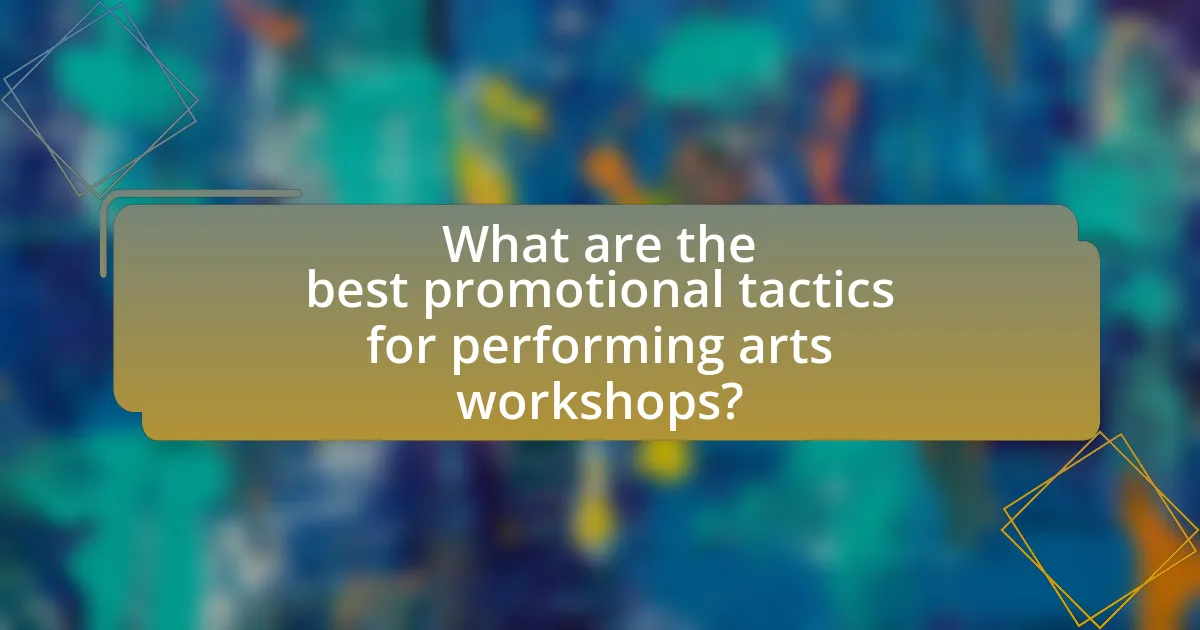
What are the best promotional tactics for performing arts workshops?
The best promotional tactics for performing arts workshops include leveraging social media marketing, collaborating with local schools and community organizations, and utilizing email marketing campaigns. Social media platforms like Facebook and Instagram allow for targeted advertising, reaching specific demographics interested in the arts, which can increase workshop visibility. Collaborating with local schools and community organizations can create partnerships that promote workshops to a wider audience, often leading to increased enrollment. Email marketing campaigns can effectively engage past participants and interested individuals by providing updates, special offers, and reminders about upcoming workshops, which has been shown to increase attendance rates.
How can partnerships enhance your marketing efforts?
Partnerships can enhance marketing efforts by expanding reach and leveraging shared resources. Collaborating with other organizations or businesses allows for access to new audiences, which can significantly increase visibility. For instance, a performing arts workshop partnered with a local theater can tap into the theater’s established customer base, resulting in higher attendance rates. Additionally, partnerships can lead to co-marketing opportunities, where both entities promote the workshop through their channels, effectively doubling the marketing impact. Research indicates that businesses that engage in partnerships experience a 20% increase in customer engagement compared to those that do not. This demonstrates that strategic alliances can provide tangible benefits in marketing effectiveness.
What types of organizations or individuals should you consider partnering with?
Consider partnering with educational institutions, community centers, and local arts organizations. Educational institutions, such as schools and universities, often seek extracurricular activities for their students, making them ideal partners for workshops. Community centers frequently host events and programs that align with performing arts, providing a platform for collaboration. Local arts organizations, including theaters and dance studios, can enhance visibility and credibility, as they share a common interest in promoting the arts. These partnerships can lead to increased participation and broader outreach for performing arts workshops.
How can collaborations expand your reach and credibility?
Collaborations can significantly expand your reach and credibility by leveraging the established audiences and reputations of partnering entities. When you collaborate with other artists, organizations, or influencers, you gain access to their followers, which can increase your visibility and attract new participants to your workshops. For instance, a study by the National Endowment for the Arts found that collaborative projects often result in a 30% increase in audience engagement compared to solo efforts. This increase in engagement not only broadens your audience base but also enhances your credibility, as associations with reputable partners can validate your expertise and offerings in the performing arts community.
What are the benefits of using email marketing for workshop promotion?
Email marketing offers several benefits for workshop promotion, including targeted outreach, cost-effectiveness, and measurable results. By allowing organizers to segment their audience based on interests and demographics, email marketing ensures that the right message reaches the right people, increasing engagement rates. According to a study by the Direct Marketing Association, email marketing has an average return on investment of $42 for every dollar spent, highlighting its cost-effectiveness. Additionally, email marketing platforms provide analytics that enable organizers to track open rates, click-through rates, and conversions, allowing for data-driven adjustments to improve future campaigns.
How can you build an effective email list for your workshops?
To build an effective email list for your workshops, you should utilize lead magnets, such as free resources or exclusive content, to attract potential attendees. By offering valuable materials like eBooks, checklists, or access to a free introductory workshop, you incentivize individuals to provide their email addresses. Research indicates that 79% of consumers prefer to receive promotional content via email, highlighting the effectiveness of this method in reaching your target audience. Additionally, promoting your lead magnets through social media and your website can significantly increase visibility and sign-ups, further enhancing your email list’s growth.
What types of content should you include in your email campaigns?
Email campaigns for marketing performing arts workshops should include promotional content, educational material, testimonials, and event details. Promotional content highlights special offers or discounts, which can increase engagement and conversions. Educational material, such as tips or insights related to the workshop’s theme, provides value and positions the sender as an authority. Testimonials from past participants build credibility and trust, encouraging new sign-ups. Lastly, clear event details, including dates, times, and registration links, ensure recipients have all necessary information to participate. These content types collectively enhance the effectiveness of email campaigns in driving attendance and interest in performing arts workshops.
How can you utilize local community events to promote your workshops?
You can utilize local community events to promote your workshops by actively participating in these events, such as setting up a booth or offering free demonstrations. Engaging directly with the community allows you to showcase your workshop’s value and attract potential attendees. For instance, a study by the National Endowment for the Arts found that community engagement increases awareness and interest in local arts programs, leading to higher participation rates. By leveraging the visibility and networking opportunities at these events, you can effectively raise awareness and drive enrollment for your workshops.
What types of events should you participate in or sponsor?
You should participate in or sponsor community arts festivals, educational workshops, and cultural events. Community arts festivals provide a platform to showcase your workshops to a diverse audience, enhancing visibility and engagement. Educational workshops allow for direct interaction with potential participants, fostering relationships and trust. Cultural events, such as theater productions or music concerts, attract individuals interested in the arts, aligning with your target demographic. These types of events not only increase brand awareness but also create opportunities for networking and collaboration within the performing arts community.
How can you effectively engage with attendees at these events?
To effectively engage with attendees at performing arts workshops, utilize interactive activities that encourage participation. Engaging attendees through hands-on experiences, such as group exercises or collaborative projects, fosters a sense of community and enhances learning. Research indicates that active participation increases retention rates by up to 75%, compared to passive learning methods. Additionally, incorporating feedback mechanisms, such as surveys or open discussions, allows attendees to voice their opinions and feel valued, further enhancing their engagement.
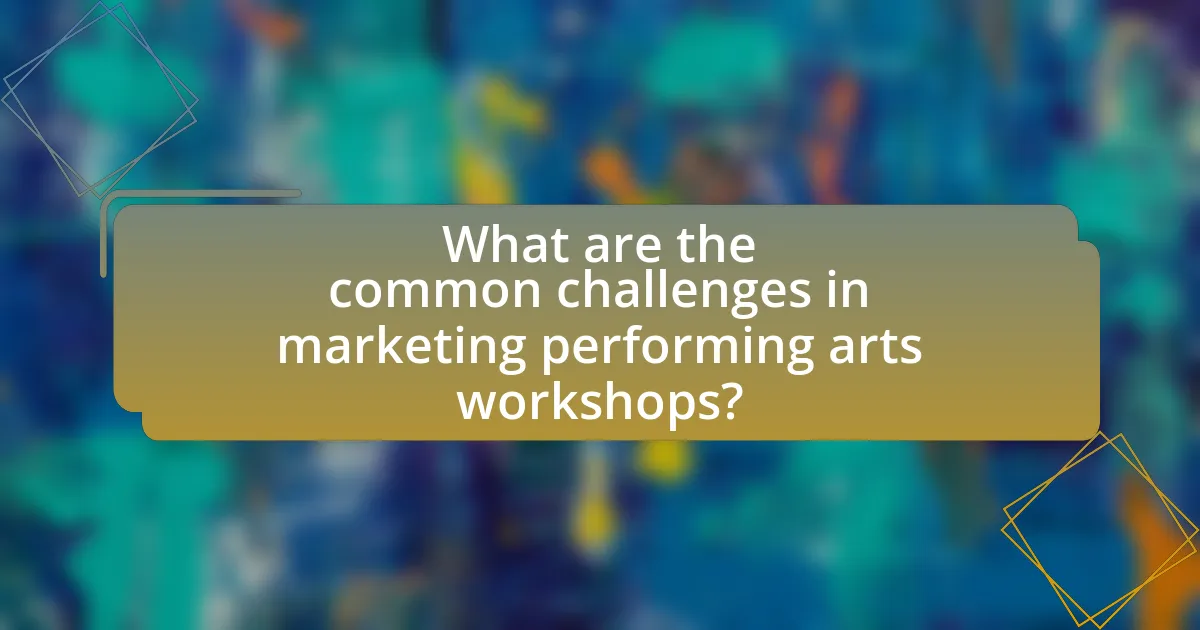
What are the common challenges in marketing performing arts workshops?
Common challenges in marketing performing arts workshops include limited audience reach, competition from other activities, and difficulty in conveying the value of the workshops. Limited audience reach arises from the niche nature of performing arts, making it hard to attract participants outside established communities. Competition from other recreational activities can divert potential attendees, as many individuals have various options for their leisure time. Additionally, conveying the unique benefits and transformative experiences of the workshops can be challenging, as potential participants may not fully understand the skills or personal growth they could gain. These challenges necessitate targeted marketing strategies to effectively engage and inform the desired audience.
How can budget constraints impact your marketing strategy?
Budget constraints can significantly limit the scope and effectiveness of your marketing strategy. When financial resources are restricted, organizations often prioritize cost-effective channels, such as social media and email marketing, over more expensive options like television or print advertising. This shift can lead to a narrower audience reach and reduced brand visibility. For instance, a study by HubSpot found that companies with limited budgets often allocate up to 40% of their marketing spend on digital channels, which may not always yield the same results as traditional methods. Consequently, budget constraints can force marketers to focus on targeted campaigns, relying on data analytics to optimize spending and maximize return on investment.
What cost-effective marketing methods can you implement?
Cost-effective marketing methods for promoting performing arts workshops include leveraging social media platforms, utilizing email marketing, and engaging in community partnerships. Social media platforms like Facebook and Instagram allow for targeted advertising at low costs, reaching specific demographics interested in the arts. Email marketing enables direct communication with potential attendees, offering personalized content and promotions, which can lead to higher engagement rates. Community partnerships with local schools, theaters, and art organizations can enhance visibility and credibility, often at little to no cost, as these collaborations can involve cross-promotion and shared resources.
How can you measure the return on investment for your marketing efforts?
To measure the return on investment (ROI) for marketing efforts, calculate the net profit generated from marketing activities divided by the total cost of those activities, then multiply by 100 to express it as a percentage. For example, if a marketing campaign costs $1,000 and generates $5,000 in revenue, the ROI would be (($5,000 – $1,000) / $1,000) * 100, resulting in a 400% ROI. This method provides a clear financial metric to assess the effectiveness of marketing strategies in generating profit relative to their costs.
What challenges do you face in reaching your target audience?
Reaching the target audience for performing arts workshops faces several challenges, primarily due to competition and audience engagement. The performing arts sector is saturated with various offerings, making it difficult to stand out and attract participants. Additionally, understanding the preferences and behaviors of the target demographic can be complex, as audience interests may shift rapidly. For instance, a survey by the National Endowment for the Arts indicates that only 45% of adults attended a performing arts event in the past year, highlighting the need for effective outreach strategies to engage potential attendees.
How can you adapt your marketing strategies to overcome these challenges?
To adapt marketing strategies for overcoming challenges in promoting performing arts workshops, focus on leveraging digital platforms and targeted audience engagement. Utilizing social media advertising allows for precise targeting based on demographics and interests, which can increase visibility and attract participants. For instance, a study by the Pew Research Center indicates that 69% of adults use social media, making it a vital channel for reaching potential workshop attendees. Additionally, implementing feedback loops through surveys can help refine offerings based on participant preferences, ensuring that marketing efforts align with audience needs. This data-driven approach enhances the effectiveness of marketing strategies, ultimately leading to higher enrollment and engagement in workshops.
What feedback mechanisms can you use to understand audience needs better?
Surveys are an effective feedback mechanism to understand audience needs better. By distributing surveys before and after workshops, organizers can gather quantitative and qualitative data on participant expectations, experiences, and suggestions for improvement. Research indicates that 70% of organizations that utilize surveys report enhanced audience engagement and satisfaction, demonstrating their value in capturing audience insights. Additionally, focus groups can provide in-depth discussions that reveal deeper motivations and preferences, allowing for a more nuanced understanding of audience needs.
What are the best practices for evaluating the success of your marketing efforts?
The best practices for evaluating the success of marketing efforts include setting clear, measurable goals, analyzing key performance indicators (KPIs), and gathering customer feedback. Establishing specific objectives, such as increasing workshop attendance by 20% within three months, provides a benchmark for success. Analyzing KPIs like conversion rates, website traffic, and social media engagement helps quantify the effectiveness of marketing strategies. Additionally, collecting customer feedback through surveys or interviews can offer insights into participant satisfaction and areas for improvement. These methods collectively ensure a comprehensive evaluation of marketing effectiveness, supported by data-driven insights.
How can you track and analyze participant engagement and feedback?
To track and analyze participant engagement and feedback, utilize digital tools such as surveys, analytics software, and social media monitoring. Surveys can be distributed post-workshop to gather direct feedback on participant experiences, while analytics software can track engagement metrics like attendance rates and interaction levels during the workshops. Social media monitoring allows for the analysis of participant comments and sentiments regarding the workshops. Research indicates that organizations using these methods can improve participant satisfaction by up to 30%, as they provide actionable insights into areas for enhancement.
What metrics should you focus on to assess your marketing effectiveness?
To assess marketing effectiveness for performing arts workshops, focus on metrics such as conversion rate, customer acquisition cost (CAC), return on investment (ROI), and engagement rate. The conversion rate indicates the percentage of leads that become participants, providing insight into the effectiveness of marketing strategies. Customer acquisition cost measures the total cost of acquiring a new participant, helping to evaluate the efficiency of marketing spend. Return on investment quantifies the profitability of marketing efforts by comparing revenue generated to marketing costs. Engagement rate reflects how well the audience interacts with marketing content, indicating its relevance and appeal. These metrics collectively provide a comprehensive view of marketing performance and areas for improvement.
